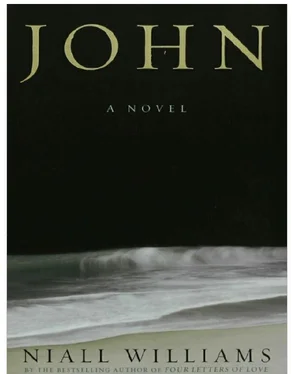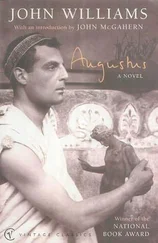'John, son of Zebedee,' you said. 'Come.'
Some moments as clear as water. Your hand held out.
A lifetime ago.
Knowing. Knowing in that first moment: I believe. I will follow you.
Andrew running up with Simon Peter. The smile in his face. How he wanted to laugh out loud with delight. As though this was a great victory. You turned to Simon and said: 'Your name shall be Cephas, Peter.'
And Andrew wanted to laugh with delight.
But gravely Peter looked at you, and bowed then and was changed already.
'Come.'
That road in the sand. The three of us just behind you speaking not at all.
The blue of the sky. The light. As if something had opened and we had walked right through.
I remember.
A feeling of light, of lightness.
And knowing. When I looked in your face. That was like no other face, and your eyes that were like no other eyes. Because of the kindness and the love. And the suffering.
'Come.'
Walking that dust road away from the river, we, your first disciples. The first time any had followed you.
So we felt chosen.
And the light and the blue of the sky. And the three of us just behind you speaking not at all.
Each of us already thinking: this is what is to be.
As if already it were written.
My Lord.
I remember.
She says not a word. She sits with the infants against her in the dark.
'I bring the word of the Lord,' Papias says. His Greek is perfect, but the woman shows no sign of having understood. Fearful for the children catching cold, he closes the door against the bitter wind. The little windowless room of the dwelling is darkened. This dark she has been sitting in, he thinks, and goes across to a rough board on the far wall to seek a lamp. His hands pat where rats are, and he bangs with his open palm on the timber several times. There is no lamp. The room is darker than the cave.
'Have you no light?'
He cannot see her eyes, only the outline of her head and the lumpish shadows of the infants. He moves closer. There is a stool with lambswool and netting; he lifts these aside and sits. He is close enough to make out her face now. Her eyes stare as though sightless, and her demeanour is of one thrown back from drowning, a straw of strength remaining.
Grief has exhausted her, Papias thinks, the good news of the Lord will be a salve.
'I am come to pray with you for the salvation of your husband, who has gone to eternal life,' he says.
She makes not the slightest movement or response, but stares on into the darkness between them. The air of the damp dwelling is close and bitter with brine. Behind him Papias hears the rats returned to the board table against the wall, scrape, nuzzle, and gnaw. He must concentrate hard to remember the order of prayers he rehearsed. Then from the unseen he smells something foul rising. It seems to thicken in the air as if the grief itself is spewed and lumpish and vile. It sickens him, the foulness, and he blinks away from beginning and scowls. The wind laughs at the door, a dry rattling. The stillness of the small room presses upon him; he feels the strangeness of it as if he is entombed, and though he has ready the words to begin, he cannot begin. The foul air, the windowless dark, the staring eyes of the widow, and the rats running down the board hungry and dissatisfied and hunting meagre nothings in the blind underfoot, these all undress his courage. He feels the wound at his ankle smart, and he makes a small noise with his sandals to keep the rodents at bay.
Still the woman stares, the children unmoving upon her breast.
A cold ooze slides on to Papias's forehead. His lips dry. I am lost, he thinks. I am not prepared. The counsel he is to give, the comfort he is to bring, are taken from him into the dark as insubstantial things. He tries to begin a silent prayer, to ask the Lord to be with him.
But the woman reaches forward and the thin bones of her fingers grasp his wrist. 'I am with demons,' she says. 'Death comes from me.' And she pulls his hand across the dark to alight on the cold infant nearest, and at once Papias knows that both children are dead. The cold of the flesh is appalling and he stands up and pulls back his hand. He cries out and rushes to the door to pull it open. The wind meets him. The light of day blinds and spins his head, and he staggers some steps to where he stumbles and bends down and voids himself on the rocks.
'Papias is not returned, Master, from the fisher's widow. I will care for you this evening,' Prochorus says.
'I need no care. You may return.'
'I have brought some bread and fish pottage.'
'Have them yourself with my blessing.'
John hears the other cross the cave to the small table and place a bowl there then return. He hears his knees crack to sit. There is the small puttering sound of a flame for the lamp.
'Shall I read with you, Master?'
'My thanks. No.'
They sit. At the mouth of the cave the wind noises. It is as if they are deep within a shell cast back by the tide whose memory is captured. John's breath is slow and thin. Next to him, the other is more restless. Prochorus is sixty years. His head is bare but for two thin ridges of grey hair above his ears. His beard is a wisp. The long fingers of his hands seem destined for fine work, and he can scribe with either one, but without instrument or papyrus they seem lost for purpose and move about on his thighs, his forearms, smooth the nothings on his pate. At sixty years he retains this energy in his body and would prefer any chore to sitting with the old apostle in silence.
'The pottage is good,' he offers.
'Prochorus, there is no need to stay. Nothing will transpire.'
There is a sigh released through the nose, there is the sound of fingers spreading on the knees and the slight friction of the cloth as Prochorus rocks very gently back and forth. The stool rhythms his restlessness.
'Should we pray, Master? Perhaps I should pray with you?'
'Pray as you return from here, Prochorus. I thank you for your intentions. I will see you at the dawn bell.'John offers his hand. But the other returns it to him and says: 'I am staying here until Papias comes.'
'Very well.'
John sits perfectly still. He has an ability Prochorus cannot fathom, to simply be. To sit in the turning of time as though nothing of him is diminished by it, as though he may wait for ever. His patience is beyond patience, is beyond any quality nameable in the vast vocabularies of the four languages Prochorus knows; it is a quality he has never seen in another human. For in the old apostle's constancy is a stillness that is not reposed or serene, no portion of him sleeps nor idles, but all is instead attentive, expectant, and indefatigable. From him there is not the smallest movement. Patior. Prochorus thinks of the Latin verb, to endure and to suffer.
The younger man folds his arms, his hands cup his elbows and he rocks forwards. He looks about him into the halo of light the lamp throws against the cave. The water sounds run, and here and there high in the roof glisten thin streams. He looks at them. He looks at the patterns of their descent, where they pool into the dark. Hunkered forwards he studies the cave floor, the beaten arc of path the years have made, elsewhere the sandal-printed dust. A place near the entrance where Papias lights small fires from what fuel can be found on that treeless isle. He rubs his palm across his beard, smoothes with right forefinger his right eyebrow. He tries to listen to the sound of the wind, to interpret in it music or messages, but hears only the howling and the loneliness.
Night is fallen; Papias is not returning. Prochorus is staying until the dawn now. He looks to the old man. Should he ask him will he be guided to the mat on the floor for sleep? Does he sleep at all?
Читать дальше










